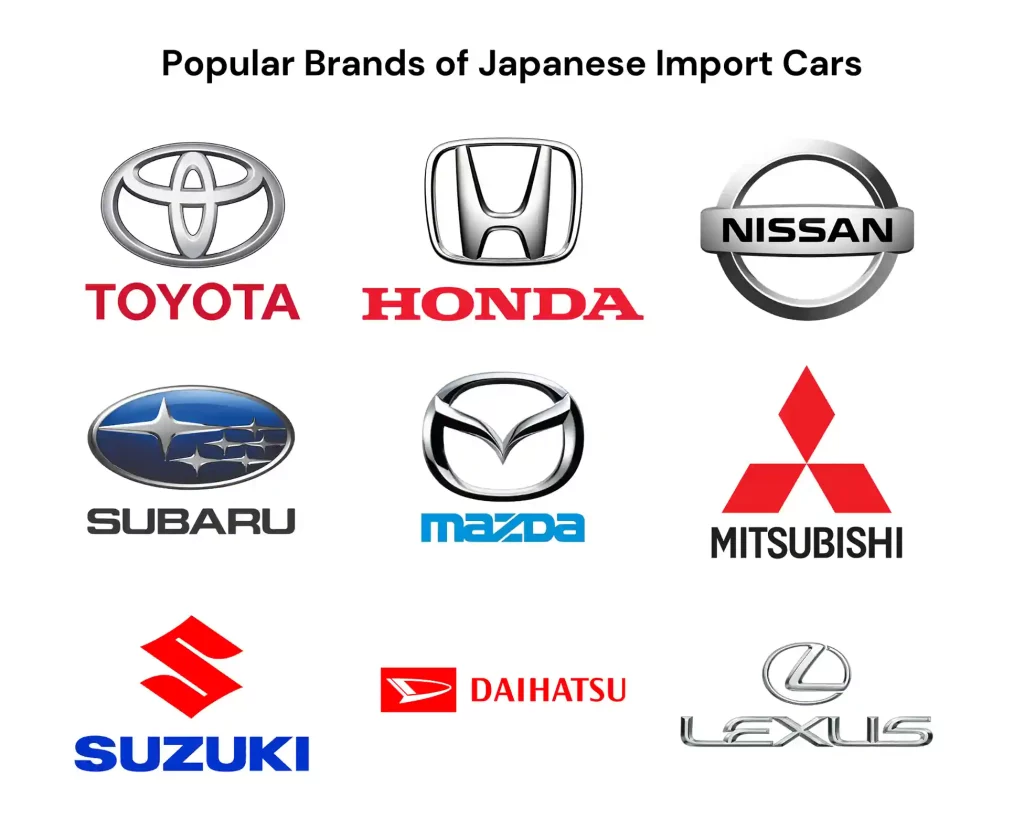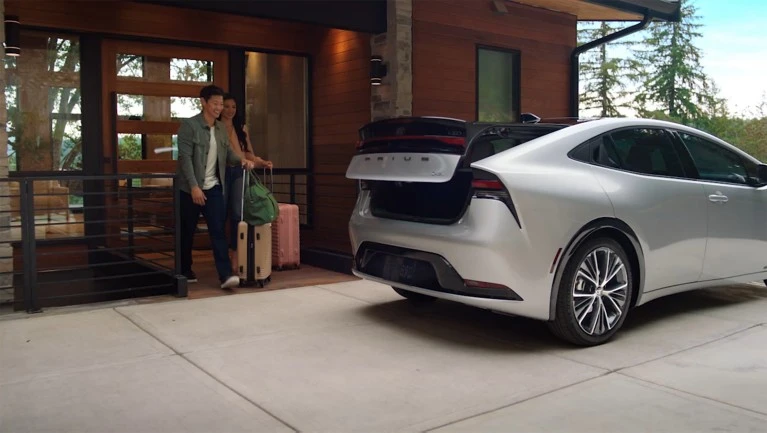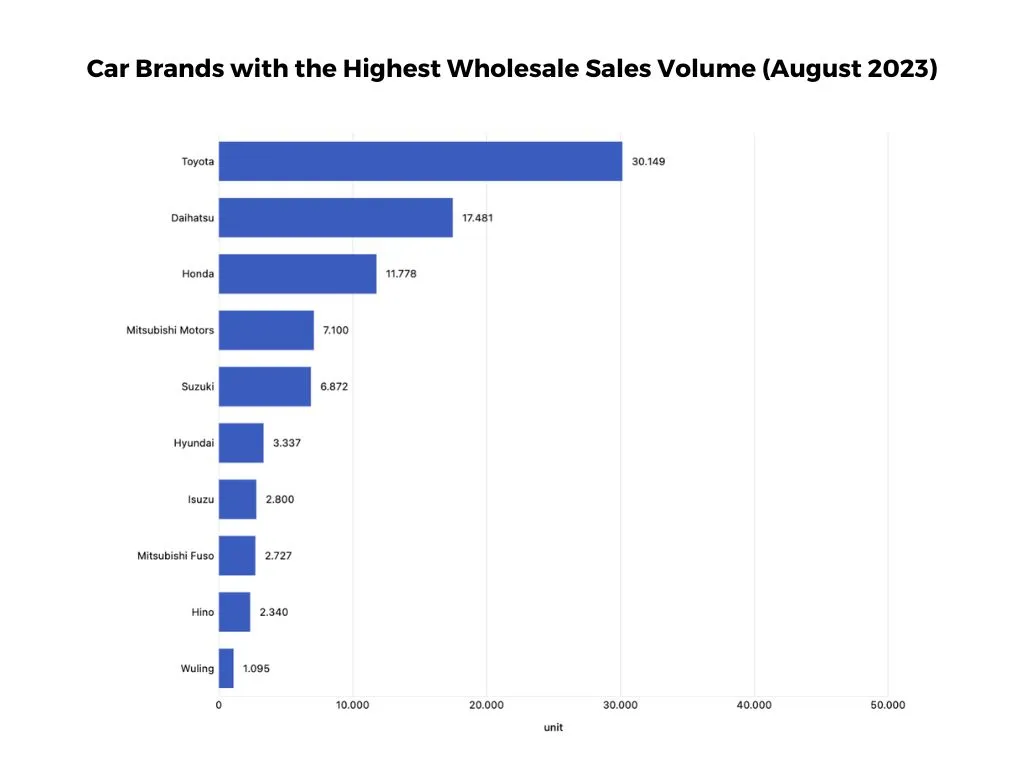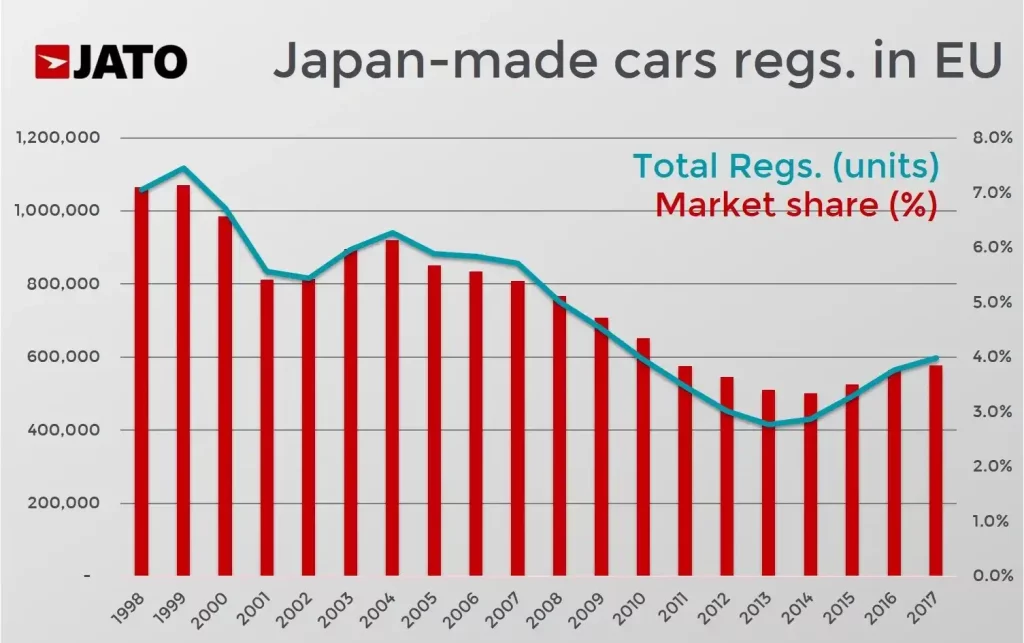Japanese import cars have gained considerable popularity over the years and even today due to their innovative technology, high efficiency, and unique design.
In this article, we will provide insights into the impact of Japanese imported cars on the automotive industry, their popular brands, and the key features that make them excel globally.
Popular Brands of Japanese Import Cars and Their Influence on Global

In 2017, Japan achieved remarkable success in the automotive industry, with sales reaching 1,060,236 units of cars, as reported by Kompas News. Impressively, Japanese brands secured a dominant 98.21% share of the car market in Indonesia during the same year.
Among these influential Japanese brands are renowned names like Toyota, Honda, Nissan, and Subaru. These brands not only hold a substantial presence in the Indonesian market but also wield significant influence globally. Here are a top manufacturer car company in Japan:
1. Toyota
Toyota is the largest car manufacturer in the world and is also one of the most popular car brands in Indonesia. Toyota is known for its robust, reliable, and fuel-efficient vehicles.
According to IDN Financials, from 2016 to 2020, Toyota was the top-selling car brand in Indonesia, always having more than 30% of the market. In 2017, it reached the highest point at 36%, while in 2018, it was 30%. In 2020, Toyota sold 180,000 cars, half of the previous years, but still held a 30% market share.
The best-sellers were Avanza and Agya, and other popular models were Innova, Fortuner, Yaris, Alphard, and Rush.
2. Honda
Honda holds the position of being the second-largest car manufacturer globally and stands out as one of the favored car brands in Indonesia, with a focus on innovation and quality.
The brand is known for its VTEC engine technology and its range of hybrid and electric vehicles, such as the Honda Insight and the Clarity Electric.
Renowned for its sporty, fuel-efficient, and high-powered cars, Honda boasts popular models in Indonesia, such as the Honda Brio, Honda HR-V, Honda CR-V, and Honda Jazz.
3. Nissan
Nissan is a global automotive company that offers a wide range of vehicles, including hybrid and electric models like the Nissan Leaf and the Infiniti QX50.
Some popular Nissan models in Indonesia include the Nissan X-Trail, Nissan Serena, and Nissan Livina.
4. Subaru
Subaru is a car manufacturer known for its safe and comfortable vehicles. The brand’s commitment to ensuring the well-being of passengers and providing a comfortable driving experience has positioned Subaru as a trusted choice among consumers.
Some popular Subaru models in Indonesia include the Subaru Forester, Subaru XV, and Subaru Impreza.
5. Suzuki
Suzuki is a Japanese manufacturing company that has dominated the global automotive industry. Founded in 1909, the company initially focused on the production of looms before venturing into motorcycles and cars.
Also, Suzuki gained global recognition with its compact and highly functional models, such as the Suzuki Swift, which is known for its affordability, fuel efficiency, and agile handling.
6. Mitsubishi
The next one is Mitsubishi, which is known as Japan’s leading car manufacturer in the automotive industry since its establishment in 1870.
Known for its innovation and quality, Mitsubishi offers a wide variety of vehicle models, ranging from compact cars to SUVs and electric models such as the Outlander and Eclipse Cross.
The brand also has a focus on sustainability, contributing to the growing demand for eco-friendly transportation. On a global scale which is based on Statista data, the expected revenue in 2024 is $3,347 million. Mitsubishi remains a dominant force in the Japanese automotive market, providing advanced technology and dependable vehicles.
7. Daihatsu
Daihatsu is a part of Toyota Motor Corporation, and also known as a Japanese car brand. Daihatsu has a market share of 17%, with their flagship cars, such as Xenia and Ayla, being the favorites in Indonesia.
In 2020, Daihatsu sold 100,000 car models of Daihatsu including Sirion, Sigra, and manufacturers. Mazdin Mazda is a Japanese automotive company specializing in the production of four-wheelers, rotary engines, diesel engines, and manual and automatic transmissions that were founded on January 30, 1929.
After that, Mazda also started its long-term partnership with a company called Ford in 1993. The company achieved a significant milestone by obtaining the ISO 9002 certificate in 1994, making Mazda the first Japanese automotive manufacturer as well.
According to Mazda’s official news, Mazda’s export volume saw a significant year-on-year increase of 74.3% in May 2023, driven by increased shipments to North America, Europe, and other regions. Also, Mazda’s global sales volume in May 2023 has surged by 50.4% year-on-year, driven by increased sales in the US, Japan, Europe, and other regions.
8. Lexus
Lexus, the luxury division under Toyota Motor Corporation, has been a driving force in the automotive industry since its establishment in 1989. Originally targeting the North American market, Lexus has evolved into a global symbol of sophistication and innovation.
The brand is identified with high-quality, cutting-edge technology and a commitment to providing a premium driving experience.
According to data collected by the Indonesian Automotive Industry Association (Gaikindo), the best-selling Lexus models during the first quarter of 2023 (January-March) in Indonesia are as follows: Lexus RX 350H, Lexus RX 350, and Lexus ES 300H.
Key Features of Japanese Import Cars

Japanese import cars are known for their unique features and advanced technology. Some of the key features include:
1. Hybrid and Electric Vehicles
Japanese import cars lead the way in the hybrid and electric vehicle market, showcasing models like the Toyota Prius, Honda Insight, and Nissan Leaf, reflecting a commitment to eco-friendly driving.
2. Safety Innovations
Japanese import cars are known for their advanced safety features, such as airbags, anti-lock brakes, traction control, adaptive cruise control, lane departure warning, and forward collision warning systems, ensuring a secure driving experience.
3. Fuel Efficiency
Japanese import cars excel in fuel efficiency, surpassing their American and European counterparts. This efficiency is attributed to advanced technology and innovative engine design, contributing to environmentally conscious driving.
4. Smart Technology Integration
Japanese import cars often feature advanced smart technology, such as voice control, navigation systems, and driver assistance features for elevating the driving experience through seamless connectivity and convenience.
Japanese import cars have had a significant impact on the global automotive industry with their innovative technology, fuel efficiency, and unique design. The popularity of brands like Toyota, Honda, Nissan, and Subaru is a testament to the quality and reliability of these vehicles.
As the demand for Japanese import cars continues to grow, their influence on the automotive industry is expected to expand, bringing with it even more advanced technology and environmentally friendly solutions.
Impact of Japanese Import Cars on the Automotive Industry

In August 2023, Indonesia got a 10.5% increase in wholesale car sales, totaling 88,876 units. Japanese brand cars, particularly Toyota, dominated the market, accounting for 33.92% of total sales. Daihatsu, Honda, and Mitsubishi Motors also secured notable positions in the top-selling brands.
Japanese import cars have had a profound impact on the global automotive industry. Their innovative technology, fuel efficiency, and unique design have made them a formidable competitor in the market. Some of the key impacts include:
1. Increased Fuel Efficiency
Japanese import cars are known for their fuel efficiency, which has reduced greenhouse emissions and made them a popular choice among environmentally conscious consumers.
2. Advanced Technology
Japanese import cars are often at the forefront of technological advancements, with features such as hybrid and electric vehicles, smart technology integration, and advanced safety innovations.
3. Quality and Reliability
Keeping everyone safe, especially when driving with your family, is the top priority. The driver holds the responsibility for the passengers. That’s why choosing a safe car is important.
Japanese import cars are well-known for being safe. They are reliable, and you don’t need to worry about their safety.
Global Market Share of Japanese Import Cars
Japanese imported cars hold a significant market share in the global automotive market, known for their reliability and innovative features.
With a strong presence in various regions, these cars continue to shape the global automotive landscape. Here are some of the regions dominated by Japanese imported cars:
a. Market Share of Japanese Import Cars in Asia-Pacific
Japanese imported cars continue to gain a 60% market share in the Asia-Pacific region, as reported by the Japan Automobile Manufacturers Association (JAMA), due to trust in local brands and commitment to quality.
b. Market Share of Japanese Import Cars in North America
According to data from the National Automobile Dealers Association (NADA), Japanese imported cars maintained their strong market share in North America in 2022, accounting for about 30% of total car sales, as their reputation for reliability and fuel efficiency strengthened their position in the region.
c. Market Share of Japanese Import Cars in Europe

According to Jato, Japan mainly sells regular cars in Europe. About two out of three imported cars are from smaller Japanese carmakers.
This trade is still good because they are not selling cars that directly compete with each other. But, their situation in each market is quite different. European-made cars mainly compete in a simple category (premium), where Lexus is the only real competition.
On the other hand, Japanese-made cars in Europe deal with a more complicated regular car category, where local brands are strong.
Let’s join with Hi-Fella, the leading B2B marketplace connecting manufacturers, suppliers, and buyers. Simplify your transactions and discover a vast network of global partners!








